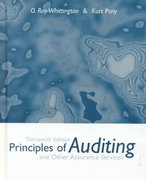Select the best answer for each of the following questions. Explain the reasons for your selection. a.
Question:
Select the best answer for each of the following questions. Explain the reasons for your selection.
a. As part of their examination, auditors obtain a representation letter from their client. Which of the following is not a valid purpose of such a letter?
(1) To increase the efficiency of the audit by eliminating the need for other audit procedures.
(2) To remind the client's management of its primary responsibility for the financial statements.
(3) To document in the audit working papers the client's responses to certain verbal inquiries made by the auditors during the engagement.
(4) To provide evidence in those areas dependent upon management's future intentions.
b. Which of the following statements best describes why auditors investigate related-party transactions?
(1) Related-party transactions generally are illegal acts.
(2) The substance of related-party transactions may differ from their form.
(3) All related-party transactions must be eliminated as a step in preparing consolidated financial statements.
(4) Related-party transactions are a form of management fraud.
c. Of the following, which is the least persuasive type of audit evidence?
(1) Confirmations mailed by outsiders to the auditors.
(2) Correspondence between the auditors and suppliers.
(3) Copies of sales invoices inspected by the auditors.
(4) Canceled checks returned in the year-end bank statement directly to the client.
d. Analytical procedures are most likely to detect:
(1) Weaknesses of a material nature in internal control.
(2) Unusual transactions.
(3) Noncompliance with prescribed control activities.
(4) Improper separation of accounting and other financial duties.
e. A primary purpose of the audit working papers is to:
(1) Aid the auditors in adequately planning their work.
(2) Provide a point of reference for future audit engagements.
(3) Support the underlying concepts included in the preparation of the basic financial statements.
(4) Support the auditors' opinion.
f. A difference of opinion concerning accounting and auditing matters relative to a particular phase of the audit arises between an assistant auditor and the auditor responsible for the engagement. After appropriate consultation, the assistant auditor asks to be disassociated from the resolution of the matter. The working papers would probably:
(1) Remain silent on the matter since it is an internal matter of the auditing firm.
(2) Note that the assistant auditor is completely dissociated from responsibility for the auditor's opinion.
(3) Document the additional work required, since all disagreements of this type will require expanded substantive testing.
(4) Document the assistant auditor's position, and how the difference of opinion was resolved.
Step by Step Answer:

Principles Of Auditing And Other Assurance Services
ISBN: 9780072327267
13th Edition
Authors: Ray Whittington, Kurt Pany





